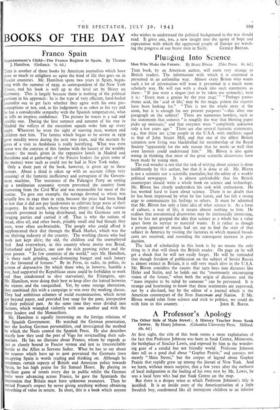Plunging Into Science
Men Who Make the Future. By Bruce Bliven. (Pilot Press. 8s. 6d.)
THIS book, by an American author, will seem very strange to British readers. The information with which it is crammed is presented in an unfamiliar way. Almost every Briton who wants such a lot of information•will want it presented in a much more scholarly way. He will run with a shock into such statements as these: "If you want a slogan (not to be taken too seriously), here it is: 'Every man a genius by the year 21422 " "Perhaps panto- thenic acid, the 'acid of life,' may be the magic potion the experts have been looking for." "This is not the whole story of the atom, but it is enough for our present purposes "—this after one paragraph on the subject! There are numerous howlers, such as the statements that osmosis "is roughly the way that blotting paper picks up moisture," and that enzymes were "completely unknown only a few years ago." There are also several fantastic statements, e.g., that there are 2,7oo people in the U.S.A. with intellects equal to that of John Stuart Mill, and that one of the ablest British scientists now living was blackballed for membership of the Royal Society "apparently for the sole reason that he wrote so well that even laymen could understand him." Mr. Bliven is also quite wrong in thinking that most of the great scientific discoveries have been made by young men.
The real wonder is not that the task of writing about science is done indifferently by this author, but that it is done at all. Mr. Bliven is not a scientist nor a scientific journalist, but the editor of a weekly political newspaper. It is almost unthinkable that his British counterpart should write a whole book on science and technology. Mr. Bliven has clearly undertaken his task with enthusiasm. He has worked hard to learn about science. There is no doubt that he has been impressed by what he has learnt, and has felt a strong urge to communicate his feelings to others. It must be admitted that Mr. Bliven has only a faint- idea of what science is. As a form of culture, a way of life, it means almost nothing to him. He realises that astronomical discoveries may be intrinsically interesting, but he has not grasped the idea that science as a whole has a value apart from its service to material wants. It is rather as though a person ignorant of music had set out to find the state of that subject in America by visiting the factories in which musical broad- casts are received, and recording the 'consequent increase in pro- duction.
The lack of scholarship in this book is by no means the only thing in it that will shock the British reader. On page 29 he will get a shock that he will not easily forget. He will be reminded that though freedom of publication on the subject of Soviet Russia is almost extinct in Britain, it is still very much alive in the U.S.A. Mr. Bliven considers the causes that turn boys into dictators like Hitler and Stalin, and he holds out the "enormously encouraging vision of the future," when both the origin of dictators and the "mass impulse to be ruled by someone" can be prevented. It is strange and heartening to know that these sentiments are expressed, not by a die-hard, but by the editor of a journal which is the American counterpart of the New Statesman and Nation. If Mr. Bliven would relax from science and stick to politics, we could do






















 Previous page
Previous page